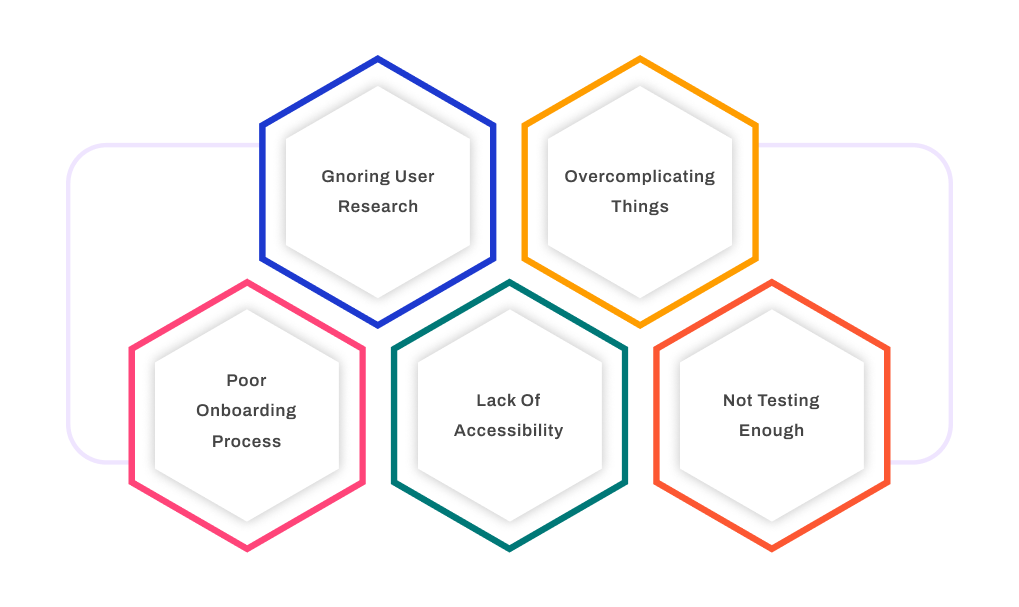- Apr 29, 2025
Share this post on:

Today, we rely on digital tools to perform tasks from entertainment to communication quickly and efficiently. Mobile apps have become a necessity for every business. However, creating a successful mobile app involves more than coding skills; developers must prioritize user experience (UX).
A well-designed website helps companies enhance the user experience, increasing the possibility of generating more leads. User experience is the
overall experience a user has while interacting with a mobile app. It encompasses various aspects such as ease of use, visual design, responsiveness, and overall satisfaction. A well-designed and intuitive user experience can significantly impact the success and adoption of a mobile app.
Why Mobile Apps Require an Effective UX Design
Mobile apps with better UX design have more chances to rank higher and drive more traffic.
“Better UX Designs Attract Potential Audiences”

Following are several reasons why mobile apps must have an effective UX design:
Increased Usability: A great UX enhances usability as customers do not have to struggle while navigating through the website. A well-designed app ensures that users can easily navigate via different screens and perform tasks without confusion or frustration. Intuitive navigation, clear labeling, and logical flow contribute to a seamless user experience. When users find an app easy to use and navigate, they are more likely to engage with it frequently and recommend it to others.
Increased User Engagement: User engagement measures the success of a mobile app. A positive user experience plays a crucial role in driving user engagement. When users find an app visually appealing, interactive, and enjoyable to use, they are more likely to spend more time within the app. This increased engagement leads to higher retention rates and improved customer loyalty. By focusing on providing a delightful user experience, mobile app developers can create apps that users want to come back to repeatedly.
Higher Conversion Rates: In the realm of e-commerce and digital marketing, conversion rates are crucial for business success. A well-designed user experience can significantly impact conversion rates in mobile apps. Developers can reduce friction points and increase conversion rates by optimizing the user journey and streamlining the conversion process. A seamless checkout process, intuitive product search, and personalized recommendations are a few examples of how user experience can drive higher conversion rates. When users find an app easy to use and navigate, they are more likely to complete their desired actions, such as making a purchase or subscribing to a service.
Brand Perception: User experience also plays a vital role in shaping the perception of a brand. A poorly designed and frustrating user experience can tarnish a brand's reputation and lead to negative reviews and ratings. On the other hand, a well-designed app that provides a delightful user experience can enhance brand perception and create positive associations with the brand. Users are more likely to trust and engage with brands that prioritize the user experience and invest in creating user-centric mobile apps.
Competitive Advantage: In today's highly competitive app market, user experience can be a significant differentiator. With millions of apps available for download, users have plenty of options to choose from. Mobile apps prioritizing user experience stand out from the crowd. By focusing on creating intuitive interfaces, seamless interactions, and visually appealing designs, developers can attract more users and retain them.
Fewer Support Costs: A well-designed user experience can also help reduce support costs for mobile app developers. When an app is intuitive and easy to use, users are less likely to encounter issues or require assistance. This reduces the burden on customer support teams and allows developers to allocate resources more efficiently. By investing in user experience upfront, developers can save time and money in the long run.
Effective UI/UX Design for Mobile App Development: Key Components
There are several key components of effective UI/UX design for mobile app development:

User Research: Understanding the target audience and their needs is crucial to creating an effective UI/UX design. User research is conducted through research such as surveys, interviews, focus groups, etc. This help businesses collect insights into user behavior, preferences, and goals.
Information Architecture: Organizing the content and structure of the app logically and intuitively is crucial for good UI/UX design. This includes defining the hierarchy of information, navigation flows, and overall layout.
Visual Design: Creating visually appealing designs that are consistent with the brand identity and appeal to the target audience is essential for effective UI/UX design. This includes choosing colors, typography, imagery, iconography, etc., that work together harmoniously.
Interaction Design: Ensuring that the app is easy to use and provides a seamless user experience requires attention to interaction design details such as animations, transitions, micro-interactions, etc.
Usability Testing: Validating the design through testing with real users is critical to ensuring that the app meets their needs and expectations. This involves identifying areas for improvement and making iterative changes based on user feedback.
Accessibility: Making the app accessible to all users regardless of disabilities or limitations is an important consideration for effective UI/UX design. This includes following accessibility guidelines and considering factors such as color contrast, font size, and keyboard navigation.
Effective UI/UX Design for Mobile App Development: Best Practices

User Experience (UX) design has become increasingly important in today's world of mobile application development. As competition grows among app developers, providing a great user experience becomes essential to stand out from the crowd. In this article, we outline the best practices for UX design in mobile application development to ensure a seamless and enjoyable user experience.
Understanding User Needs: The first step towards crafting a great UX is to gain insights into user behavior patterns and requirements. Developers must conduct extensive research to learn about target audiences, their pain points, and their motivations. They should analyze competitors' offerings and industry trends to identify opportunities for innovation. Once armed with this knowledge, developers can begin mapping out user journeys and defining user flows.
Design Thinking Approach: Developers should adopt a human-centered approach to design thinking by focusing on solving problems faced by end-users. This methodology emphasizes empathy and collaboration to develop solutions tailored to specific user needs. By applying design thinking principles, developers can create intuitive interfaces that simplify complex workflows and enhance user satisfaction.
Consistent Visual Language: Creating a consistent visual language throughout the app ensures a coherent and recognizable appearance. This consistency fosters trust and familiarity among users, making them feel comfortable navigating the app. To achieve this goal, developers should define a style guide that covers typography, colors, icons, and other graphic elements used within the app.
Easy Navigation: Navigation should be straightforward, allowing users to find what they want without hassle. Clear calls-to-action and visible buttons facilitate easy interactions, while search functions enable quick access to the desired content. Developers should organize menus logically and provide clear indicators of progress along the user journey.
Effective UI/UX Design for Mobile App Development: Elements
Good user experience (UX) design is critical to the success of any product or service. It plays a vital role in shaping people's perceptions and influencing their behaviors. In this article, we will discuss the various elements that constitute good UX design and explain why each element is crucial to delivering a satisfying user experience.

Clarity and Simplicity: Clarity and simplicity are fundamental components of effective UX design. A clean and uncluttered interface makes it easier for users to understand how an app works and what actions they can take. Simple designs also help reduce cognitive overload and increase task completion rates.
Intuitive Interactions: Intuitive interactions allow users to accomplish goals without requiring explicit instructions. Well-crafted gestural and tactile interactions help users navigate the app effortlessly, even when working with minimal attention. Intuitive interactions also promote better recall of information and improved decision-making.
Visually Attractive: A visually appealing design captivates users and encourages exploration and interaction. Color schemes, typography, graphics, and imagery work together to form a harmonious whole that resonates with users on functional and emotional levels.
Consistency: Consistency in design maintains a uniform look and feel throughout the app, helping users recognize elements and predict how things work. It reduces confusion and errors caused by inconsistencies in design, thereby improving overall usability.
Flexibility and Adaptability: An adaptable design accommodates diverse user needs and preferences. The ability to customize settings according to individual requirements enables users to personalize their experience and interact with the app in ways most meaningful to them.
Error Prevention and Recovery: Error prevention and recovery measures minimize negative consequences resulting from erroneous inputs or unexpected events. Effective error-handling strategies educate users on how to avoid similar mistakes in future interactions, thus promoting learning and skill buildup.
Effective UI/UX Design for Mobile App Development: Mistakes to Avoid

Mobile app development requires careful consideration of user experience (UX). Neglecting certain aspects during development may result in poor UX, causing users to abandon your app.
Ignoring User Research: Lack of user research leads to assumptions about user needs and expectations, which often results in misguided design decisions. Conducting thorough research helps you understand user behavior patterns, preferences, and pain points. Skipping this stage might lead to a subpar UX that fails to engage users.
Overcomplicating Things: Overloading an app with too many features creates complexity that confuses users. Strive for simplicity by identifying core tasks and prioritizing functionality based on user needs. An overwhelming interface increases cognitive load, reducing task completion rates and damaging UX.
Poor Onboarding Process: Inadequate onboarding processes leave new users feeling lost and frustrated. Providing clear instructions and guiding users through initial interactions helps establish a positive relationship between them and your app. Failure to do so risks losing potential loyal customers who cannot grasp basic operations.
Lack of Accessibility: Ignoring accessibility considerations excludes users with disabilities or special needs. Ensuring accessibility means catering to different abilities and devices, such as screen readers, magnifiers, or touch input. Neglecting these factors limits your audience and undermines UX efforts.
Not Testing Enough: Poor testing procedures compromise app quality and UX. Insufficient testing leads to bugs, crashes, and other issues that negatively impact user experiences. Thorough testing across multiple environments and scenarios helps catch defects early and prevents negative reviews or low ratings.
To Summarize:
In conclusion, user experience is of paramount importance in mobile app development. It directly impacts usability, engagement, conversion rates, brand perception, competitive advantage, and support costs. By prioritizing user-centric design principles and continuously iterating based on user feedback, developers can create mobile apps that meet users' needs and provide them a delightful and memorable experience.
FAQ's
Why is user experience (UX) important in mobile app development?
User experience matters because it shapes how people feel when they use your app. A great UX makes your app easy and enjoyable, keeping users engaged. At ToXSL Technologies, we focus on creating user-friendly designs that leave a positive impression and encourage users to return.
How does good UX design help my mobile app succeed?
Good UX design helps users complete tasks quickly and comfortably. This means more downloads, better reviews, and longer user engagement. At ToXSL Technologies, we build apps that are simple to navigate and designed with real users in mind, giving your app the best chance to succeed.
Can poor UX affect the performance of my app?
Yes, poor UX often leads to users deleting your app or leaving negative feedback. Confusing navigation or slow responses make users frustrated. To avoid this, our team at ToXSL Technologies ensures every app is tested thoroughly for usability, speed, and comfort.
How do you ensure great UX in mobile app development?
We start by understanding what your users need. Then, we plan intuitive layouts, create clean designs, and test every feature. At ToXSL Technologies, we make sure your app isn’t just functional—it’s enjoyable and easy to use from start to finish.












